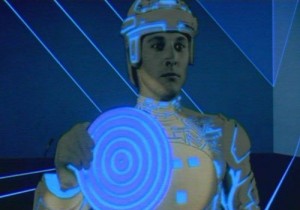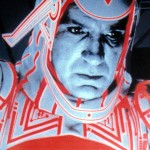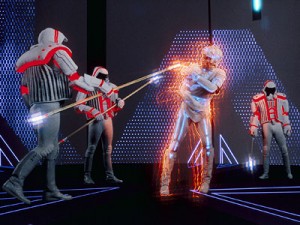In 1982 two of my favorite things in the world were science fiction movies and video arcades. When those two passions were merged into a movie called Tron, my brain exploded. Over the years rumors of a Tron sequel came and went, but in 2008 a teaser trailer was shown at San Diego’s Comic-Con, and crappy camcorder footage began popping up on YouTube faster than Disney could issue take-down notices.
 Director and cowriter Steven Lisberger was inspired by both the video game Pong and Stanley Kubrick’s 1960 gladiatorial epic Spartacus. Though Tron was one of the early pioneers of computer-generated imagery, there’s a lot less CGI in the film than one might think. While certain shots of the light cycles, tanks, and Solar Sailer are fully computer generated, the bulk of Tron‘s iconic look was created through a process known as backlit animation, in which the actors are filmed in black and white and then colorized using various techniques, including rotoscoping.
Director and cowriter Steven Lisberger was inspired by both the video game Pong and Stanley Kubrick’s 1960 gladiatorial epic Spartacus. Though Tron was one of the early pioneers of computer-generated imagery, there’s a lot less CGI in the film than one might think. While certain shots of the light cycles, tanks, and Solar Sailer are fully computer generated, the bulk of Tron‘s iconic look was created through a process known as backlit animation, in which the actors are filmed in black and white and then colorized using various techniques, including rotoscoping.
In the film’s story, the world of the computer is inhabited by “programs” that are presented in human form, and some of them refer to the people who programmed them as “Users,” though they have no idea what the real world looks like or if it even exists. Programs who believe in the Users are considered to be followers of an ancient religion and are ordered by the MCP (Master Control Program) to renounce their beliefs or else they’ll be forced to fight each other in the video game arena.
Jeff Bridges plays Kevin Flynn, a former employee of a software company called ENCOM whose video game programs were plagiarized by coworker Ed Dillinger (the amazing David Warner). The games turned out to be highly successful, thus beginning Dillinger’s meteoric rise at ENCOM and leaving Flynn to open an arcade after being canned by his nemesis. Flynn attempts to hack into the company’s system with a program called Clu (also played by Bridges in the computer world), seeking evidence of Dillinger’s plagiarism until Clu is caught by the MCP — a program written by Dillinger, naturally.
 The tightened security resulting from Clu’s capture causes other Users to be shut out of the system, including Alan Bradley (Bruce Boxleitner), who’s been working on a security program called Tron. It’s designed to work independently of the MCP and monitor communications between ENCOM’s system and others, something the MCP doesn’t want, as it ultimately has bigger plans than just running ENCOM’s system.
The tightened security resulting from Clu’s capture causes other Users to be shut out of the system, including Alan Bradley (Bruce Boxleitner), who’s been working on a security program called Tron. It’s designed to work independently of the MCP and monitor communications between ENCOM’s system and others, something the MCP doesn’t want, as it ultimately has bigger plans than just running ENCOM’s system.
When Flynn tries to hack into the system again from a terminal in ENCOM’s laser lab, the MCP digitizes him, bringing him into the computer world so he can face certain death on the game grid. There he meets Bradley’s program, Tron (Boxleitner again), and along with another program called Ram (Dan Shor), they work together to find a way to bring down the MCP. Along the way Flynn discovers that as a User he has special powers in the computer world, such as the ability to reconstruct a damaged Recognizer — and why not, considering the cybernated vehicle came from the Space Paranoids game he created.
Admittedly, the screenplay has some corny lines in it. I’m thinking in particular of Ram’s line to Crom (a compound interest program) after they’ve been thrown into a holding cell: “I’d say ‘Welcome, friend,’ but not here … not like this.” There’s also Tron’s rather obvious observation after they escape from the light-cycle arena: “We made it — this far.”
But there’s also some very cool stuff, such as the way the programs refer to dying as being “de-rezzed.” Another cool moment occurs in a confrontation between Dillinger and a longtime ENCOM employee named Walter Gibbs (Barnard Hughes, also amazing): “You can remove men like Alan and me from the system, but we helped create it — and our spirit remains in every program we design for this computer.”
 Another thing I’ve always loved about Tron is how it presents parallels between the real world and the computer world, like the way Dillinger’s helicopter almost looks like a vehicle from the computer world with its red and blue neon lights. There’s probably no greater example of this than the time-lapse shot right before the end credits, as nightfall descends on the film’s anonymous urban setting and the cars and lights on-screen blur until they begin to resemble the circuitry inside a computer.
Another thing I’ve always loved about Tron is how it presents parallels between the real world and the computer world, like the way Dillinger’s helicopter almost looks like a vehicle from the computer world with its red and blue neon lights. There’s probably no greater example of this than the time-lapse shot right before the end credits, as nightfall descends on the film’s anonymous urban setting and the cars and lights on-screen blur until they begin to resemble the circuitry inside a computer.
There’s also the exchange between Tron and Flynn after the latter reveals himself to be a User. Tron points out that “if you are a User, then everything you’ve done has been according to a plan, right?”
Flynn laughs and replies, “Well, you guys know what it’s like. You just keep on doing what it looks like you’re supposed to be doing, no matter how crazy it seems.”
“Well, that’s the way it is for programs.”
“I hate to disappoint you, pal, but most of the time that’s the way it is for Users too.”
At last year’s Comic-Con another teaser trailer for Tron‘s sequel was revealed, along with the film’s official title, Tron Legacy, and a replica of Flynn’s Arcade containing multiple working Space Paranoids game consoles.
[kml_flashembed movie="http://www.youtube.com/v/a1IpPpB3iWI" width="600" height="344" allowfullscreen="true" fvars="fs=1" /]
And earlier this month a brand-new trailer debuted in theaters, attached to Tim Burton’s Alice in Wonderland.
Joseph Kosinski, a first-time director with a computer graphics background, takes the reins from Steven Lisberger, who’s one of the producers of Tron Legacy. I find it somewhat disappointing that he doesn’t have a larger creative role, but I’m still hopeful — after all, Tron was his directorial debut (his only other directing credits are the 1987 John Cusack comedy Hot Pursuit and 1989’s Slipstream).
All of this new footage simply makes me giddy, especially the return of Bruce Boxleitner and of course newly minted Oscar winner Jeff Bridges. I don’t brave the opening-weekend crowds much anymore, but for Tron Legacy I’m making an exception.
End of line.

![Reblog this post [with Zemanta]](http://img.zemanta.com/reblog_e.png?x-id=ff9a79cc-563d-40df-bb06-3dc71ae3d94f)



Comments